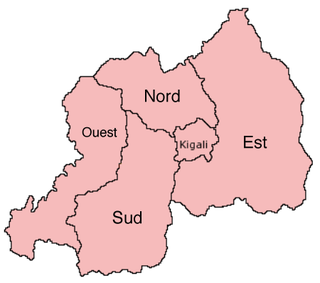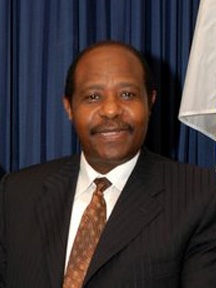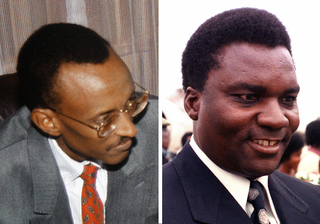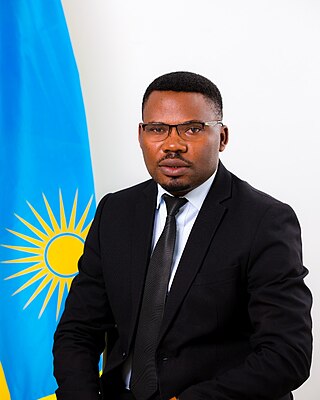Various television networks, newspapers, and radio stations operate within Rwanda. These forms of mass media serve the Rwandan community by disseminating necessary information among the general public. [1] They are regulated by the self-regulatory body. [2]
The New Times is the largest English-language and the oldest in Rwanda. [3] It also owns a newspaper joint in the local language Kinyarwanda, called Izuba Rirashe. The newspaper has been criticized for being "too servile" to the ruling party of Rwanda, [4] and being "excessively optimistic". [5] As such, competitors in the English-language newspaper industry have sprung up in recent years, with the formation of another large-scale English newspaper News of Rwanda in 2011. [6] Other minor newspapers have also been created to counter the pro-establishment role of the newspaper, such as The Rwandan, [7] Rwanda Eye [8] and Business Daily. [9]
Several newspaper publishers also provide Kinyarwanda-language newspapers, including both News of Rwanda and The Rwandan. [10] In June 2018, News of Rwanda closed.
The Rwandan television industry is made 12 TV stations. 84% of TV stations owned by private(10 out of 12) While 8% and 8% are owned by public and Religious organisations respectively. The state-owned Rwandan Broadcasting Agency runs the TV station Rwanda Television (RTV). [11]
Likewise, radio in Rwanda is mainly conducted through a subsidiary of the RBA, Radio Rwanda. [12] The radio station offers Kinyarwanda, French, Kiswahili and English language services [13] in FM 100.7. As such, it is used to complement other media which mainly provided services in English and Kinyarwanda, the two popular languages in Rwanda. Due to the recent economic development in Rwanda, radio has taken less precedence among other forms of communication, and the government has also focused on improving the television industry in Rwanda.
A major share of the market is controlled by nine indigenous publishers, among which four have opened bookshops in the country. [14] Before the genocide against the Tutsi, there were no publishing houses in Rwanda. The situation improved after the incident, with the first indigenous publisher established in the country, Bakame Editions. [15] Since the turn of the century, major publishers from all across the world such as Oxford University Press and Macmillan Publishers have begun making inroads into the local publishing industry. [16] However, the establishment of publishing houses locally and from abroad has not instituted a healthy reading culture in Rwanda, and local publishers have decried the fact that the younger generation does not often participate in this pastime. Despite the boom in the local publishing industry, a similar spell of growth has yet to be seen in the commercial trading of books. Bookstores remain a rare sight in Rwanda, and the first library in the country was established in 2012 in Kigali. [14]
A statutory authority has been established according to the Constitution of Rwanda, called The Media High Council. The official mission of the council is to guide the industry in reflecting trends of globalization, to equip the industry with the skills required, and to conduct necessary research to improve the sector. [17] The legal responsibilities of the council is further elaborated in section Nº03/2013 of the law. [18] Freedom of the press in Rwanda is enshrined within Article 34 of the Constitution of Rwanda: [19]
"Freedom of the press and freedom of information are recognized and guaranteed by the State.
Freedom of speech and freedom of information shall not prejudice public order and good morals, the right of every citizen to honour, good reputation and the privacy of personal and family life. It is also guaranteed so long as it does not prejudice the protection of the youth and minors.
The conditions for exercising such freedoms are determined by law.
There is hereby established an independent institution known as the "High Council of the Press ».
The law shall determine its functions, organization and operation."
As such, it is imperative for the government and the people to recognize the freedom of the press in Rwanda, as stated in the Constitution of Rwanda. The media should be free from all government intervention, and is only governed by the autonomous Media High Council.
According to Freedom House, Rwanda's Press Freedom score was 79 in 2015 (0 represents the best score, 100 represents the worst score), and was considered "not free" by its standards. [20] Throughout the years, journalists have faced continuous harassment from the government, including arbitrary arrests and threats. Journalists also practice self-censorship for fear of government retaliation, dealing a severe blow to Rwanda's freedom of the press. [21] The government also actively participated in potentially unconstitutional acts of interfering with the media, by banning BBC's Kinyarwanda service in Rwanda due to the airing of a controversial documentary. [22] [23]

Rwanda, officially the Republic of Rwanda, is a landlocked country in the Great Rift Valley of Central Africa, where the African Great Lakes region and Southeast Africa converge. Located a few degrees south of the Equator, Rwanda is bordered by Uganda, Tanzania, Burundi, and the Democratic Republic of the Congo. It is highly elevated, giving it the soubriquet "land of a thousand hills", with its geography dominated by mountains in the west and savanna to the southeast, with numerous lakes throughout the country. The climate is temperate to subtropical, with two rainy seasons and two dry seasons each year. It is the most densely populated mainland African country; among countries larger than 10,000 km2, it is the fifth most densely populated country in the world. Its capital and largest city is Kigali.

Rwanda is a de facto one-party state ruled by the Rwandan Patriotic Front and its leader Paul Kagame since the end of the 1994 genocide against members of the Tutsi ethnic group. Although Rwanda is nominally democratic, elections are manipulated in various ways, which include banning opposition parties, arresting or assassinating critics, and electoral fraud.
Telecommunications in Rwanda include radio, television, fixed and mobile telephones, and the Internet.

Kigali is the capital and largest city of Rwanda. It is near the nation's geographic centre in a region of rolling hills, with a series of valleys and ridges joined by steep slopes. As a primate city, Kigali is a relatively new city. It has been Rwanda's economic, cultural, and transport hub since it was founded as an administrative outpost in 1907, and became the capital of the country at independence in 1962, shifting focus away from Huye.

Juvénal Habyarimana was a Rwandan politician and military officer who served as the second president of Rwanda, from 1973 until his assassination in 1994. He was nicknamed Kinani, a Kinyarwanda word meaning "invincible".

Paul Kagame is a Rwandan politician and former military officer who has been the fourth President of Rwanda since 2000. He was previously a commander of the Rwandan Patriotic Front (RPF), a rebel armed force which invaded Rwanda in 1990. The RPF was one of the parties of the conflict during the Rwandan Civil War and the armed force which ended the Rwandan genocide. He was considered Rwanda's de facto leader when he was Vice President and Minister of Defence under President Pasteur Bizimungu from 1994 to 2000 after which the vice-presidential post was abolished.

The Interahamwe is a Hutu paramilitary organization active in the Democratic Republic of the Congo and Uganda. The Interahamwe was formed around 1990 as the youth wing of the National Republican Movement for Democracy and Development, the then-ruling party of Rwanda, and enjoyed the backing of the Hutu Power government. The Interahamwe, led by Robert Kajuga, were the main perpetrators of the Rwandan genocide, during which an estimated 500,000 to 1,000,000 Tutsi, Twa, and moderate Hutus were killed from April to July 1994, and the term "Interahamwe" was widened to mean any civilian militias or bands killing Tutsi.

The provinces of Rwanda are divided into districts (akarere) and municipalities (umujyi). Prior to January 1, 2006, Rwanda was composed of 12 provinces. The Rwandan government decided to establish new provinces in an attempt to address issues that arose from the Rwandan genocide. The new provinces were to be "ethnically-diverse administrative areas".

The Rwanda Defence Force is the military of the Republic of Rwanda. The country's armed forces were originally known as the Rwandan Armed Forces (FAR), but following the Rwandan Civil War of 1990–1994 and the Rwandan genocide of 1994 against the Tutsi, the victorious Rwandan Patriotic Front (Inkotanyi) created a new organization and named it the Rwandan Patriotic Army (RPA). Later, it was renamed to its current name.

Paul Rusesabagina is a Rwandan human rights activist. He worked as the manager of the Hôtel des Mille Collines in Kigali, during a period in which it housed 1,268 Hutu and Tutsi refugees fleeing the Interahamwe militia during the Rwandan genocide. None of these refugees were hurt or killed during the attacks.

The Rwandan Civil War was a large-scale civil war in Rwanda which was fought between the Rwandan Armed Forces, representing the country's government, and the rebel Rwandan Patriotic Front (RPF) from 1 October 1990 to 18 July 1994. The war arose from the long-running dispute between the Hutu and Tutsi groups within the Rwandan population. A 1959–1962 revolution had replaced the Tutsi monarchy with a Hutu-led republic, forcing more than 336,000 Tutsi to seek refuge in neighbouring countries. A group of these refugees in Uganda founded the RPF which, under the leadership of Fred Rwigyema and Paul Kagame, became a battle-ready army by the late 1980s.
Georges Henri Yvon Joseph Ruggiu is a Belgian radio presenter who worked for Rwandan radio station Radio Télévision Libre des Mille Collines, which played a significant role in promoting the genocide against the Tutsi. Like the station's other broadcasters, Ruggiu incited violence against Tutsi and moderate Hutu over the air. He had become involved in Rwandan politics just two years before the genocide.

The Parliament of Rwanda has consisted of two chambers since 2003:

The Amahoro Stadium, officially known as Amahoro National Stadium, is a multi-purpose stadium in the Gasabo district of Kigali, Rwanda. With a capacity of 45,000, it is the largest stadium in Rwanda and hosts football matches, concerts, and public events. The football clubs Armée Patriotique Rwandaise F.C. and Rayon Sports F.C. are the tenants. The venue is also sometimes used for rugby union.

The New Times is a national English language newspaper in Rwanda. It was established in 1995 shortly after the Rwandan genocide. They also used to have a Kinyarwanda-language weekly called Izuba Rirashe.

Human rights in Rwanda have been violated on a grand scale. The greatest violation is the Rwandan genocide of Tutsi in 1994. The post-genocide government is also responsible for grave violations of human rights.

Presidential elections were held in Rwanda on 9 August 2010, the second since the Rwandan Civil War. Incumbent President Paul Kagame of the Rwandan Patriotic Front (RPF) was re-elected for a second seven-year term with 93% of the vote.

Louise Mushikiwabo is the fourth and current Secretary General of the Organisation internationale de la Francophonie. She previously served as the Minister of Foreign Affairs and Cooperation of Rwanda from 2009 to 2018. She also served as Government Spokesperson. She had previously been Minister of Information.
Since the end of the Rwandan Civil War, many forms of censorship have been implemented in Rwanda.

Edouard Bamporiki is a Rwandan politician and artist. Bamporiki served in Rwandan cabinet as States Minister in charge of culture in the Ministry of Youth and Culture until 5th May 2022